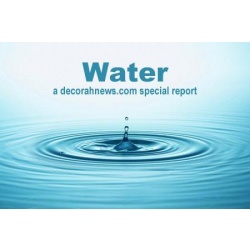
Water: a decorahnews.com special report
Aside from a clear public health concern, the issue of water quality has ripple effects which can extend beyond health and into many other spheres.
The tourism industry in northeast Iowa is uniquely tied to the water, particularly when it comes to anglers who travel from across the country to come and fish the world-class trout streams of the Driftless Area.
As one hotel manager in Viroqua, Wisconsin said, "As soon as the season is open, we have fishermen staying at our hotel. And once they have fished the area, they keep coming back all summer long."
In the Driftless Area, recreational fishing is a $1.1 billion industry annually; equivalent to one third of Wisconsin's dairy industry and far exceeding the combined revenues of Illinois' professional sports teams.
According to a joint study conducted by Trout Unlimited and NorthStar Economics about the Economic Impact of Recreational Trout Angling in the Driftless Area, direct spending on fishing is only one part of this revenue.
This study estimated that of that $1.1 billion economic impact per year, more than $465 million qualifies as "ripple effect" money, which is spent aside from fishing--in local restaurants and bars, lodging and on entertainment.
The money brought into the region by fishing has often been used for stream preservation. Trout Unlimited chapters have spent more than $45 million in restoring the streams of the Driftless Area, at an average cost of $100,000 per mile of stream.
According to Tom Murray of Trout Unlimited's Driftless Chapter, the conservation efforts are necessary not only for an improvement to public health, but also for economic stability.
"Conservation is a good investment not only because it keeps our landscape beautiful and our water clean," Murray said. "It also supports our diverse and robust local economy."
Murray said that efforts by individuals to conserve the land around the streams are good, but they will not be enough. Murray said that we need more regulations over our conservation practices.
"I'm encouraged by landowners who put forth an effort to conserve land," Murray said, "Now we need to have legislative government get together with organizations to help local communities."
Site designed and maintained by Iroc Web Design Services©.
Your Small Business Web Design Solutions.™


